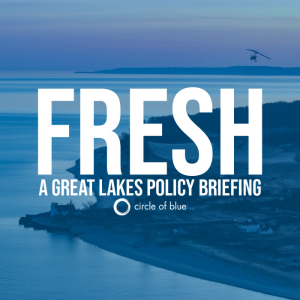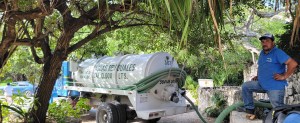The Stream, February 7, 2024: At Its Driest Point in 1,200 Years, Catalonia Will Enforce Harsh Water Limits and Build Desalination Plants

Sau Reservoir, shown here in February 2014, is a main source of water for Barcelona. Today, the reservoir is less than 4 percent of its capacity as the Catalonia region of Spain endures a sharp drought. Photo courtesy of Flickr/Creative Commons user Anselm Pallas
YOUR GLOBAL RUNDOWN
- The global expansion of AI computing is increasing the technology’s water consumption, for cooling its equipment.
- The loss of papyrus swamps on Lake Victoria’s shore threatens livelihoods and biodiversity in Kenya.
- With reservoirs at all-time lows amidst a three-year drought, Spain will invest half a billion dollars to build two desalination plants in Catalonia.
- Leaders in Lagos, Nigeria, are considering banning single-use plastics and styrofoam to reduce the capital’s overwhelming amount of water pollution.
An atmospheric river continues to bring extreme rains and dangerous flooding to Southern California.
“Anytime you have these rainfall amounts intersecting with terrain and the built environment, you’re going to have trouble.” — Greg Carbin, the branch chief of forecast operations for the National Weather Service, to the New York Times.
Heavy rains continue to batter Southern California, where half a year’s worth of precipitation has fallen in just the past several days, CNN reports. Half a million people have experienced power outages, and close to 16 million are living under “high risk of excessive rainfall,” officials say. Already, more than 10 inches of rain have fallen in parts of the Los Angeles area, thanks to an atmospheric river that is stronger than the previous two experienced in the region. Several people have died due to storm-related causes, and hundreds of thousands have lost their electricity. Scientists say the El Niño weather phenomenon and climate crisis have exacerbated the power of the dangerous weather pattern, which is expected to begin subsiding on Tuesday.
— Christian Thorsberg, Interim Stream Editor
Recent WaterNews from Circle of Blue
- Cancer-Related Disease and Deaths Spur Actions to Fight Farm Chemical Contamination in Corn Belt — Lawmakers and health officials in Iowa, Minnesota, and Nebraska are pursuing an array of new strategies aimed at reducing the risks to human health.
- Supreme Court Poop Dispute Could Have Big Impact on Michigan Environment — Michigan regulators want more limits on manure pollution from the biggest livestock farms
The Lead
Spanish officials announced last week a series of water use restrictions for more than 200 villages, towns, and cities — including Barcelona — amidst the Iberian peninsula’s driest period in 1,200 years, Reuters reports.
Those living in the Catalonia region will be barred from washing their cars and filling up swimming pools as local governments urge residents to cut their water consumption by five percent, and farmers by as much as 80 percent. Competitive swimming clubs can continue to operate, so long as they close their showers. Hotels have imposed a “four-minute shower challenge” for tourists. And trees will be limited in how much they are watered, irrigated only to the point that guarantees their survival.
With reservoirs in the region falling to 16 percent capacity, officials said they would begin shipping approximately 40,000 cubic meters of water per day from a desalination plant in Sagunto to ports in Barcelona.
Earlier this week, $502 million was set aside for the construction of two local desalination plants, to be built north and south of Barcelona, with the combined capacity to treat 21 billion gallons of water annually.
This Week’s Top Water Stories, Told In Numbers
200
Number of papyrus stalks growing on the shores of Lake Victoria an experienced harvester will pick per day, weaving the plants into mats that are later sold at market in Kisumu, Kenya. But this livelihood and others — such as fishing and trap-making — are at risk, as the lake’s wetland ecosystems are being given over to agriculture and housing, Mongabay reports. Some 2,500 acres of papyrus swamps have been lost between 1990 and 2017 in the Ombeyi wetland, a crucial hotspot for fish and wildlife biodiversity.
143,000
Approximate number of tons of plastic waste that end up in Nigerian waters each year, Al Jazeera reports. To combat the pollution, officials in Lagos are contemplating a ban on polystyrene and single-use plastics, a dramatic move that would likely benefit the environment but immediately disrupt informal economies of waste collectors and food vendors.
In context: Vietnam’s Tourism and Fishing Industries Drown in Waste
On the Radar
Artificial intelligence’s surging popularity is increasing the technology’s consumption of water, Yale Environment 360 reports. Millions of gallons of freshwater are used to moderate equipment temperatures, and the number is growing — “Google’s data centers used 20 percent more water in 2022 than in 2021, while Microsoft’s water use rose by 34 percent.” One estimate suggests that a 10- to 50-message conversation with Chat GPT-3 “drives the consumption of a half-liter of fresh water.”
More Water News
Chile Wildfires: The death toll in central Chile has risen to 112, Al Jazeera reports, as wildfires exacerbated by high temperatures and droughts continue to rage this week.
Pakistani Mangroves: Whereas mangrove forests around the world continue to decline sharply, Pakistan tripled its coverage between 1986 and 2020, Mongabay reports.
Christian Thorsberg is an environmental writer from Chicago. He is passionate about climate and cultural phenomena that often appear slow or invisible, and he examines these themes in his journalism, poetry, and fiction.







Leave a Reply
Want to join the discussion?Feel free to contribute!